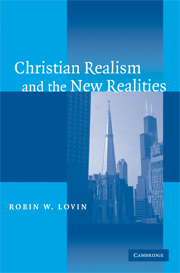2 - A Short History of Christian Realism
Published online by Cambridge University Press: 05 June 2012
Summary
REALITY AND RESPONSIBILITY
The Christian realisms that we explored in the previous chapter call for further exploration of their history. The increasing complexity of global relationships and the sharp differences that separate our world from the world that Reinhold Niebuhr knew make different understandings of Christian realism inevitable, but the lines along which these interpretations divide reflect older and deeper controversies in Christian theology and ethics.
Christians have always lived in the tension between ultimate reality and immediate responsibility. From the beginning, they have expected God's ultimate victory over all conditions that threaten the meaning of life and deprive human action of purpose. Christians measure choice and action by this hope, and not by the chances of success or failure. Thus, theologians as different as Stanley Hauerwas and Reinhold Niebuhr have affirmed that doing Christian ethics requires thinking eschatologically. This accounts for the persistence of apocalyptic movements and ideas in lived Christian faith, even in a secular, scientific age. It also helps to explain why today's Counterapocalyptic Realists are so urgent in rejecting a political apocalypse that puts the recreation of the world in the hands of the powerful. To do that destroys the distinctive hope that Christian eschatology has always offered to the poor.
Christian hope, however, is not only eschatological. The world which God will finally rule is also God's creation, which means that it is from the beginning ordered toward that end.
- Type
- Chapter
- Information
- Christian Realism and the New Realities , pp. 43 - 83Publisher: Cambridge University PressPrint publication year: 2008



